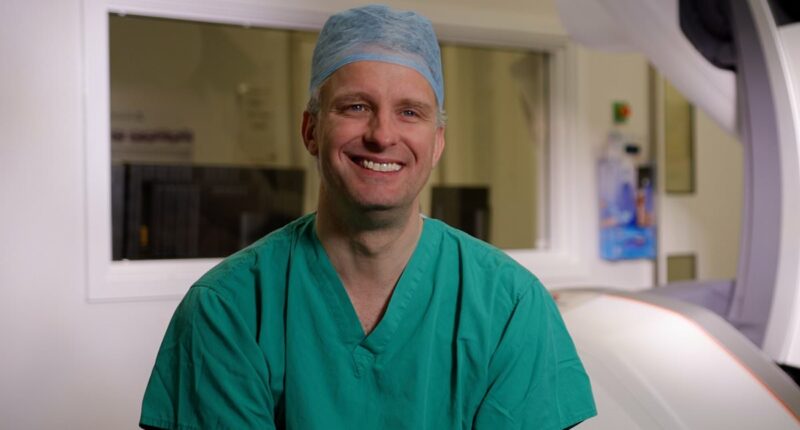Share this @internewscast.com
A groundbreaking medical procedure has taken place in Europe, where a British man, facing the threat of amputation, became the continent’s first patient to benefit from a revolutionary ‘dissolvable stent’ implant. This innovation is poised to transform the treatment landscape for numerous patients grappling with blocked arteries, offering an alternative when conventional methods fall short.
The procedure, medically referred to as an angioplasty, traditionally involves the insertion of small balloons into obstructed blood vessels. This technique works to expand the vessels, thereby improving blood flow. However, doctors in Newcastle have made a remarkable advancement, applying this procedure in a novel way to aid a man suffering from peripheral artery disease.
In a pioneering move, they employed a dissolvable stent to maintain the artery’s openness after it was widened with a balloon. Unlike the commonly used metal stents, this cutting-edge version is crafted from a material akin to dissolvable stitches.
The significant advantage of this new stent lies in its ability to biodegrade within the body. It gradually breaks down over two years and completely vanishes in three, offering a promising new option for treatment without the long-term presence of metal within the body.
While most stents are made of metal, the new innovative model is made from the same material as dissolvable stitches.
It means the stent breaks down in the body within two years and completely disappears in three.
In the meantime, the body’s cells grow into the stent, meaning the arteries stay open naturally even when the stent is no longer there.
Stephen Laurie, the first UK patient to be successfully treated with the device said: ‘I’ve had problems over a number of years and some previous treatment to try and improve my health, including a heart bypass.’

Newcastle have used the procedure to widen the artery in the leg of a man with peripheral artery disease, by putting in a balloon and then kept it open with a small tube, known as a stent. Pictured, James McCaslin, the consultant vascular surgeon who carried out the procedure
The 60-year-old from Cramlington in Northumberland, added: ‘This time, my consultant suggested using this new stent, to tackle some of the ongoing problems in my lower leg.
‘The procedure was really quick and I was back on my feet within hours, out and about.
‘I’ve now got no pain in my leg and am hoping to go back to work a week after the treatment.’
About a fifth of people over the age of 60 in the UK have some form of peripheral artery disease.
But it is most common — and dangerous — in those with diabetes, high blood pressure and obesity.
Smokers are also far more likely to develop it.
The condition occurs when arteries become clogged with plaque, preventing blood flow and oxygen from reaching the lower legs and feet.
These blocked vessels below the knee often lead to severe pain, wounds that won’t heal and, in some cases, even limb amputation.

The stent procedure, developed by US healthcare giant Abbott, will now be rolled out across other hospitals in the UK including St Thomas’ Hospital in London and Glenfield Hospital in Leicester
James McCaslin, a consultant vascular surgeon who carried out the procedure at the Freeman Hospital in Newcastle, said: ‘This stent, which is made from the same material as dissolvable stitches, provides a fantastic option to treat artery disease below the knee.
‘It is inserted through a small hole in the groin — commonly known as keyhole surgery — and is designed in a way to prevent re-blockage of the artery, hopefully reducing the need for additional procedures and the risk of long-term complications such as amputation.
‘A dissolvable stent has additional benefits over a normal stent because it means nothing is left behind to get in the way of any further procedures if needed.’
The stent procedure, developed by US healthcare giant Abbott, will now be rolled out across other hospitals in the UK including St Thomas’ Hospital in London and Glenfield Hospital in Leicester.
Jonathan Wood, regional director for Abbott Vascular, North Europe said: ‘We’re proud to bring this device — known as Esprit BTK — to patients in the UK.
‘It’s a breakthrough that combines structural support, targeted drug therapy, and fully dissolves — leaving nothing behind.
‘With 9 in 10 patients now avoiding repeat procedures, it’s a powerful step forward in vascular innovation, helping people live healthier, fuller lives.’

















